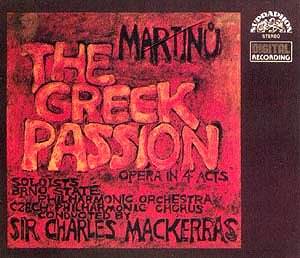Martinu
The Greek Passion
 Soloists of Welsh National
Opera/Brno State Philharmonic Orchestra/Czech Philharmonic Chorus/Sir Charles
Mackerras
Soloists of Welsh National
Opera/Brno State Philharmonic Orchestra/Czech Philharmonic Chorus/Sir Charles
Mackerras
 Supraphon 10 3611-2
[114'
55"]
Supraphon 10 3611-2
[114'
55"]
Crotchet
Amazon
UK Amazon USA

Bohuslav Martinu had condensed and adapted the novel Christ
Recrucified by Nikos Kazantzakis to construct the English libretto for
his unconventional work, intended for Covent Garden in the 1950s and championed
then by its music director, Rafael Kubelik. In 1957 it was however rejected
by the Covent Garden Board for what now seem rather flimsy reasons. Criticisms
led to a drastic reworking during the last two years of Bohuslav Martinu's
life. The through-composed second version, given in this recording, was only
premiered in Zurich after his death in 1959.
Martinu's method helps to make the text audible and intelligible at all times,
dispensing with the need for the text in the liner notes. It succeeds in
getting across moral arguments dressed in religious terms. Broad themes borrowed
from Christian mythology are interwoven with historical and political elements.
An established, but amoral, hierarchy, represented by the priest Grigoris,
shores up its authority with pomp. The refugees, who are led by their priest
Folis, represent the counterpart to this established order. They are dispossessed
but moral authority is vested in them.
Caught between these two conflicting poles are the villagers. For some of
them, especially Manolios, the Christ in the village Passion Play and Katerina
as their Mary Magdalene, this conflict becomes intensely personal. For all
of them chosen the responsibility towards, and understanding of, the Gospels
become more than a play for acting in. They are led to enact 'The Word'.
This is a 1981 recording of the revised version of Martinu's last opera,
not performed in his lifetime, and in the original version not until its
triumphant restoration at Covent Garden
reviewed
by Seen&Heard in April 2000.
This Supraphon recording of The Greek Passion, in the original English,
is a great success. The singers include John Mitchinson, John Tomlinson,
Arthur Davies, Geoffrey Moses, Helen Field and many stalwarts of the Welsh
company. The Czech orchestra is in fine form and the playing idiomatic and
committed. The chorus is a chief protagonist in this complex interaction
of two religious groups, each with its Priest, the ostracism of refugees
firing the drama and the local singers make a vivid contribution. The words
are all admirably clear and the argument easy to follow. The engineers capture
the perspectives and distances well, helping to make it an involving experience
for the listener.
Until the restored original version is revived at Covent Garden, as it is
sure to be, and then recorded, hopefully, this Supraphon double-CD can be
recommended as containing the essence of the work, given with the energy
and conviction which Sir Charles Mackerras brings to every project.
Reviewer
Peter Grahame Woolf

